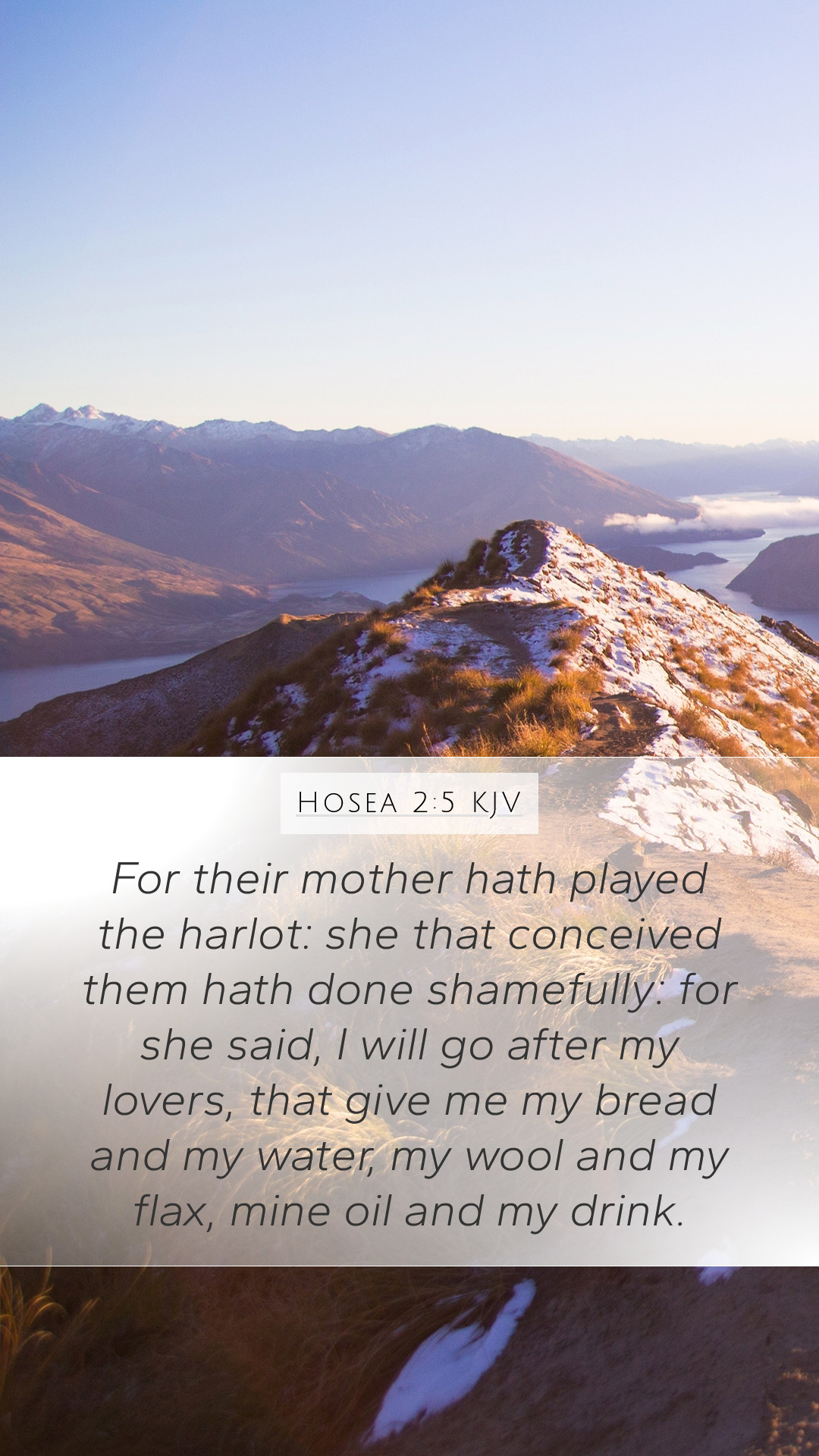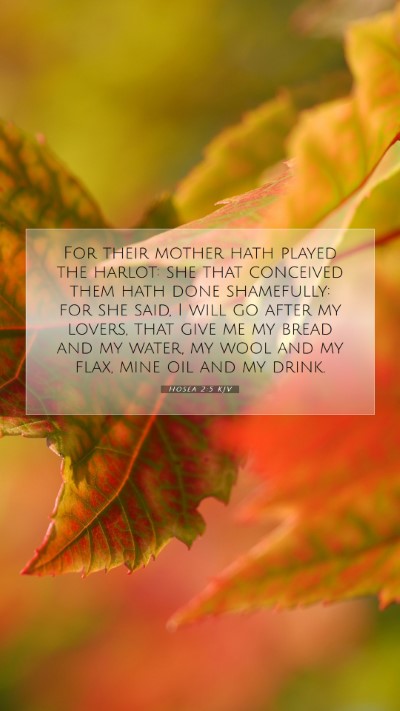Old Testament
Genesis Exodus Leviticus Numbers Deuteronomy Joshua Judges Ruth 1 Samuel 2 Samuel 1 Kings 2 Kings 1 Chronicles 2 Chronicles Ezra Nehemiah Esther Job Psalms Proverbs Ecclesiastes Song of Solomon Isaiah Jeremiah Lamentations Ezekiel Daniel Hosea Joel Amos Obadiah Jonah Micah Nahum Habakkuk Zephaniah Haggai Zechariah MalachiHosea 2:5 Meaning
What is the meaning of Hosea 2:5?
For their mother hath played the harlot: she that conceived them hath done shamefully: for she said, I will go after my lovers, that give me my bread and my water, my wool and my flax, mine oil and my drink.
Hosea 2:5 Bible Verse Meaning
Understanding Hosea 2:5
Verse Reference: Hosea 2:5
"For their mother has played the harlot; she who conceived them has acted shamefully. For she said, 'I will go after my lovers, who give me my bread and my water, my wool and my flax, my oil and my drink.'" (Hosea 2:5, NASB)
Interpretation Overview
In this verse, the prophet Hosea uses the metaphor of marital unfaithfulness to illustrate the unfaithfulness of Israel to God. The "mother" represents Israel, while the "lovers" symbolize pagan nations and idols to which the Israelites often turned for sustenance and support instead of relying solely on Yahweh. This metaphor emphasizes the spiritual adultery of the nation, demonstrating a profound departure from their commitment to God.
Key Insights from Public Domain Commentaries
-
Matthew Henry's Commentary:
Henry emphasizes that God's people are often likened to an unfaithful wife, illustrating their betrayal of God through idolatry. He notes that their pursuit of worldly pleasures and material provisions is akin to a husband's disloyalty, which incites divine wrath. Henry argues that Israel's reliance on other nations for their needs is a vivid display of their spiritual blindness and ingratitude toward God, the ultimate provider.
-
Albert Barnes' Notes on the Bible:
Barnes focuses on the image of the "harlot," likening Israel’s actions to the shameful behavior of a woman who abandons her husband for others. He points out that the nation's claim that their provisions come from these "lovers" contradicts the reality that it is God who ultimately sustains and nurtures them. Barnes underlines the foolishness of Israel’s choices and encourages readers to recognize God as the source of all blessings.
-
Adam Clarke's Commentary:
Clarke elaborates on the metaphorical language used in this verse. He explains that the "mother" not only signifies the collective nation of Israel but also highlights the individual communities and the idolatrous practices they engage in. Clarke's perspective calls attention to the intricacies of Israel's societal practices that lead to spiritual decline and emphasizes the desperate need for repentance and return to God.
Biblical Exegesis and Context
The context of Hosea 2:5 lies within a broader narrative depicting Israel's unfaithfulness to God. Throughout the Book of Hosea, the prophet conveys God’s anguish over Israel’s rebellious nature and the consequences of their actions. The use of marital infidelity as a central theme underscores the intimate relationship between God and His people and the pain caused by their infidelity.
Historical Context
This verse reflects the historical setting of Israel during a time of great sin and moral decay. The Israelites were engaging in idol worship and forming alliances with other nations rather than trusting in God's providence. Hosea’s prophetic message serves as a warning of impending judgment if they do not repent and return to God.
Applications of Hosea 2:5
For modern readers, Hosea 2:5 serves as a stark reminder of the importance of faithfulness to God. Just as Israel sought fulfillment in earthly "lovers," individuals today may be tempted to find satisfaction in materialism or relationships that pull them away from their commitment to God.
- Spiritual Reflection: Reflect on areas in life where you may seek fulfillment outside of your relationship with God.
- Engagement with Scripture: Use this verse as a basis for deeper biblical study and reflection on God’s faithfulness versus human unfaithfulness.
- Prayer for Restoration: Seek God's guidance and restoration in areas of spiritual compromise.
Cross References
Hosea 2:5 can be related to the following cross-referenced Bible verses:
- Jeremiah 3:6-10 - Discusses Israel's unfaithfulness and God's call to return.
- Ezekiel 16:15-34 - Describes God's disappointment with Israel's idolatry.
- James 4:4 - Warns against friendship with the world as enmity against God.
Conclusion
Hosea 2:5 offers profound insights into the nature of Israel's unfaithfulness and God's relentless pursuit for reconciliation. This verse serves as a powerful reminder today of the call to remain devoted to God, recognizing His provision and love as the true source of life.
Further Study Suggestions
Explore the depths of this verse and similar passages through:
- Bible study guides focused on the Book of Hosea.
- Online Bible study resources that delve into prophetic literature.
- Bible study groups that foster discussions on the themes of fidelity and idolatry in Scripture.


